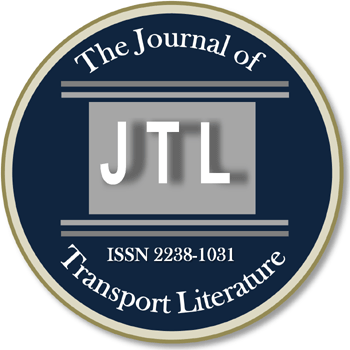Abstracts
Using a large matched employer-employee data set with information at both the worker and the company level we characterise the Portuguese airlines' employment structure and, by comparing it with the general structure of the Portuguese labour force, we stress the particularities of the sector. Based on the Heckman selection model, we develop an analysis of the variables that influence wages in this sector and which contribute to its differentiation from the general labour market. Particular attention is paid to the disparity among different types of jobs in the air transportation sector, namely amongst flight crews and land personnel. We also analyse the differences between regular and non-regular sub-sectors. Our main findings indicate that the aviation sector labour force is clearly specific regarding gender distribution and human capital accumulated by its workers. Moreover, some professions, pilots in particular, have important specificities compared to other jobs even within the sector. We also find that wages are strongly influenced by levels of education, tenure and experience as well as professional categories, which appears as an important specificity of this sector.
labour; airlines; wages; human capital
Usando uma grande base de dados com correspondência empregador-empregado com informações tanto ao nível do trabalhador quanto da empresa, caracterizamos a estrutura de emprego das companhias aéreas portuguesas e, por meio de comparação com a estrutura geral da força de trabalho portuguesa, destacamos as particularidades do setor. Com base no modelo de seleção de Heckman, desenvolvemos uma análise das variáveis que influenciam os salários neste setor e que contribuem para a sua diferenciação do mercado de trabalho em geral. É dada atençao especial para a disparidade entre os diferentes tipos de empregos no setor de transporte aéreo, ou seja, entre os tripulantes e o pessoal de terra. Analisamos também as diferenças entre os subsetores de aviação regular e não-regular. Nossos principais resultados indicam que a força de trabalho no setor de aviação é claramente específica quanto à distribuição de gênero e de capital humano acumulado por seus trabalhadores. Além disso, algumas profissões, pilotos em particular, têm especificidades importantes em comparação com outros tipos de trabalhos, mesmo dentro do setor. Também apontamos para evidências de que os salários são fortemente influenciados pelos níveis de escolaridade, senioridade e experiência bem como pelas categorias profissionais, que aparecem como uma especificidade importante deste setor.
trabalho; companhias aéreas; salários; capital humano
- Association of European Airlines - AEA (2006). AEA Yearbook
- Blyton, P., Lucio, M., McGurk, J. and Turnbull, P. (2001) Globalization and trade union strategy: industrial restructuring and human resource management in the international civil aviation industry, International Journal of Human Resource Management, vol. 12, n. 3, pp. 445-463.
- Button, K., Costa, A and Reis, V. (2005) How to control airline routes from the supply side: the case of TAP, Journal of Air Transportation, vol. 10, n. 3, pp. 50-72.
- Card, D. (1986) The impact of deregulation on the employment and wages of airline mechanics, Industrial and Labor Relations Review, vol. 39, n. 4, pp. 527-37.
- Crémieux, P. Y. (1996) The effect of deregulation on employee earnings: pilots, flight attendants, and mechanics, 1959-1992. Industrial and Labor Relations Review, vol. 49, n. 2, pp. 223-42.
- Doeringuer, P. B. and Piore, M. J. (1971) Internal Labor Markets and Manpower Analysis Lexington, Mass.: D. C., Heath and Company.
- Hätty, H. and Hollmeier, S. (2003). Airline strategy in the 2001/2002 crisis - the Lufthansa example, Journal of Air Transport Management, vol. 9, n. 1, pp. 51-55.
- Heckman, J. (1979) Sample selection bias as a specification error, Econometrica, vol. 47, n. 1, pp. 153-161.
- Hirsch, B. and McPherson, D. (2000) Earnings, rents and competition in the airline labor market, Journal of Labor Economics, vol. 18, pp. 126-155.
- Inglada, V. and Rey, B. (2004) Spanish air travel and the September 11 terrorist attacks: a note, Journal of Air Transport Management, vol. 10, n. 6, pp. 441-443.
- International Civil Aviation Organization - ICAO (2007) News release 08/07 Available at www.icao.int
- Ito, H. and Lee, D. (2005) Assessing the impact of the September 11 terrorist attacks on U.S. airline demand, Journal of Economics and Business, vol. 57, pp. 75-95.
- Lucio, M., Turnbull, P., Blyton, P. and McGurk, J. (2001) Using regulation: an international comparative study of the civil aviation industry in Britan and Spain, European Journal of Industrial Relations, vol. 7, pp. 49-68.
- Pinto, F. (2002) TAP Annual Report 2002 Available at www.tap.pt
- Neven, D. and Roller, L. (1996) Rent sharing in the European airline industry, European Economic Review, vol. 40, pp. 933-940.
- Turnbull, P. and Harvey, G. (2001) The impact of 11 September 2001 on the civil aviation industry: social and labour effects Sectoral activities programme working paper. International Labour Office Geneva.
- Turnbull, P., Blyton, P. and Harvey, G. (2004) Cleared for take-off? Management-labour partnership in the civil aviation industry, European Journal of Industrial Relations, vol. 10, n. 3, pp. 287-307.
- Turney, M., Bishop, J., Karp, M., Sitker, R. and Green, M. (2002) National survey results: retention of women in collegiate aviation, Journal of Air Transportation, vol. 7, n. 1, pp. 69-92.
Publication Dates
-
Publication in this collection
07 Nov 2013 -
Date of issue
July 2013
History
-
Received
23 Sept 2012 -
Accepted
10 Oct 2012 -
Reviewed
08 Oct 2012

